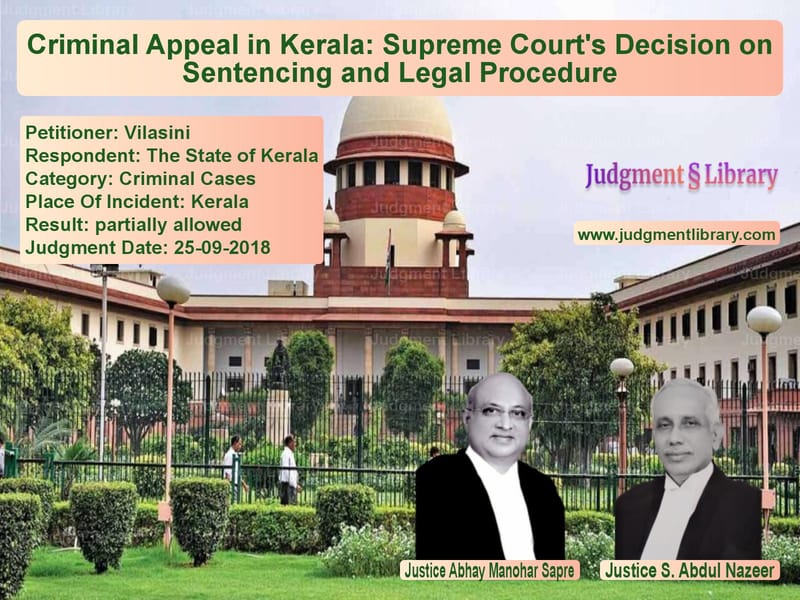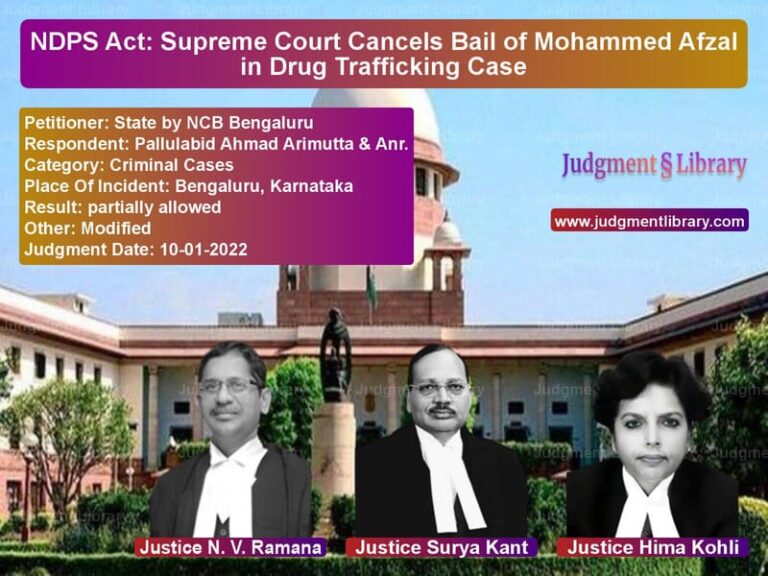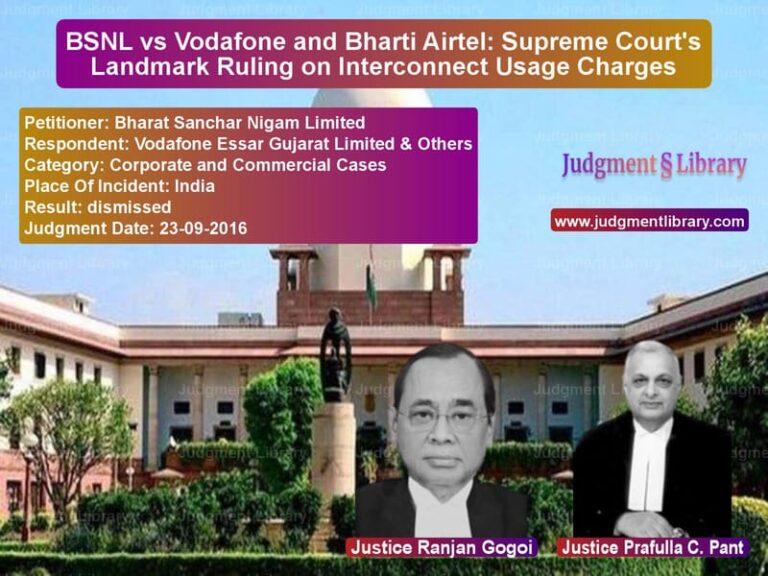Criminal Appeal in Kerala: Supreme Court’s Decision on Sentencing and Legal Procedure
The case of Vilasini vs. The State of Kerala is a significant criminal appeal that highlights the importance of judicial discretion in sentencing and procedural compliance in criminal cases. The Supreme Court had to determine whether the punishment awarded to the appellant was fair and proportionate to the offense and whether any legal or procedural lapses warranted a modification of the sentence.
The case also raised fundamental questions about the sentencing policy in India, the necessity for considering mitigating factors, and the court’s role in ensuring that punishments do not become excessive or disproportionate to the crime committed.
Background of the Case
The appellant, Vilasini, had been convicted by a lower court for an offense under the Indian Penal Code (IPC), and the High Court upheld the conviction. However, she appealed to the Supreme Court, arguing that the punishment was excessive and that certain mitigating circumstances were not considered.
The primary issue before the Court was whether the sentence should be reduced or revised based on judicial precedents and sentencing guidelines. The case also highlighted the importance of ensuring procedural fairness, particularly when a conviction carries a significant punishment.
Legal Issues Before the Court
- Was the sentence imposed on the appellant proportionate to the crime committed?
- Did the trial court follow the due process of law in convicting and sentencing the appellant?
- Were there any mitigating factors that should have been considered while determining the punishment?
- Did the High Court err in upholding the conviction and sentence without independent analysis?
Petitioners’ Arguments
The appellant, Vilasini, argued that:
- The punishment awarded was too severe considering the nature of the offense.
- There were mitigating factors, including the appellant’s age and health condition, which were ignored by the lower courts.
- The procedural lapses in the investigation and trial process led to an unfair conviction.
- Judicial discretion should be exercised to ensure fairness in sentencing.
Respondents’ Arguments
The State of Kerala countered the appellant’s arguments, stating that:
- The conviction was based on strong evidence, and the High Court had correctly upheld the decision.
- The punishment awarded was appropriate given the seriousness of the offense.
- The procedural requirements had been met, and no miscarriage of justice had occurred.
- The case did not warrant any exceptional treatment or leniency in sentencing.
Supreme Court’s Observations
The Supreme Court, comprising Abhay Manohar Sapre and S. Abdul Nazeer, made the following key observations:
1. Importance of Fair Trial and Due Process: “A conviction must be based on unimpeachable evidence, and sentencing must reflect the principles of justice and proportionality. Courts must ensure that procedural lapses do not infringe upon the rights of the accused.”
2. Sentencing Guidelines and Judicial Discretion: “Sentencing is a crucial part of the criminal justice process. While the nature of the offense is important, courts must also consider the individual circumstances of the accused. Where mitigating factors exist, a balanced approach is warranted.”
3. Proportionality in Punishment: “A punishment must fit the crime. If a sentence appears unduly harsh in comparison to the offense committed, courts have the power to intervene and reduce it.”
Final Judgment and Directions
The Supreme Court ruled in favor of modifying the sentence and issued the following directions:
- The sentence was reduced considering the mitigating factors presented by the appellant.
- The conviction remained intact, but the punishment was revised to ensure proportionality.
- All pending applications related to the case were disposed of.
Impact of the Judgment
This ruling has significant implications for criminal law and sentencing principles:
- It reinforces the principle that sentencing should be proportionate to the offense.
- It highlights the need for courts to consider mitigating circumstances while imposing punishment.
- It sets a precedent for reviewing sentencing decisions in cases where punishments may seem excessive.
- It ensures that procedural fairness is maintained at every stage of criminal proceedings.
Conclusion
The Supreme Court’s decision in this case upholds the necessity of a fair trial, due process, and proportionate sentencing. By modifying the sentence while affirming the conviction, the Court ensured that justice was served while maintaining the integrity of the legal process.
Petitioner Name: Vilasini.Respondent Name: The State of Kerala.Judgment By: Justice Abhay Manohar Sapre, Justice S. Abdul Nazeer.Place Of Incident: Kerala.Judgment Date: 25-09-2018.
Don’t miss out on the full details! Download the complete judgment in PDF format below and gain valuable insights instantly!
Download Judgment: Vilasini vs The State of Kerala Supreme Court of India Judgment Dated 25-09-2018.pdf
Direct Downlaod Judgment: Direct downlaod this Judgment
See all petitions in Bail and Anticipatory Bail
See all petitions in Public Interest Litigation
See all petitions in Judgment by Abhay Manohar Sapre
See all petitions in Judgment by S. Abdul Nazeer
See all petitions in partially allowed
See all petitions in supreme court of India judgments September 2018
See all petitions in 2018 judgments
See all posts in Criminal Cases Category
See all allowed petitions in Criminal Cases Category
See all Dismissed petitions in Criminal Cases Category
See all partially allowed petitions in Criminal Cases Category







